- Home
- John Bellairs
The Bell, the Book, and the Spellbinder Page 6
The Bell, the Book, and the Spellbinder Read online
Page 6
The woman raised her eyes and looked thoughtful. "You know, when I was a little girl, people believed that old place to be haunted. They called it the Spellbinder house and said an evil magician had built it back before the Civil War. It used to be a mark of courage for a boy to run up and touch the house and then run away. I don't s'pose kids do that kind of thing nowadays. Too much television, I say."
"How very odd. The Spellbinder house, eh? But Jarmyn Thanatos does own it?" asked the professor.
"That's what the records say." She pulled another heavy, green-bound ledger off a shelf and consulted it. "And he's paid the taxes on the place every year."
The professor craned his neck, trying to sneak a peek into the book. "Do you have a current address for this Mr. Thanatos?"
"Just a post-office box in Mount Tabor," she said, clapping the book shut in a puff of dust. "I'm sorry, but I really have other things to do. Good-bye, now."
That put the professor in a foul temper. He stomped out of the town hall muttering and complaining. It was time for lunch, and they ate ham and cheese sandwiches and potato chips at a small cafe between a pharmacy and a feed store. Then they piled into the Pontiac.
"Well, we can at least take a gander at the old Thanatos mansion," growled the professor, starting the car. "It's probably a fool's errand, but we've come this far already, so we might as well make our trip complete."
They drove slowly north, made the turn onto the gravel road, and rumbled along until Sarah spotted a roof back past the trees. A rutted, overgrown drive was just passable enough to let the professor pull the car off the road. They climbed out and he led the way forward, pushing through rank weeds and springy chest-high maple saplings. They suddenly came to the edge of a weird clearing, and they all stopped with a gasp.
A two-story wooden house stood before them. Once, it had been painted white, but the paint had flaked away except for a few leprous, scabby blotches on the weathered gray wood. Attached to the right side of the house was a tall tower, with arched openings in the top. They could see a great bell hanging there, a dark form against the blue sky of early afternoon. The windows of the house were broken and smeared with ancient dirt, and many of them had been boarded over. But the strangest thing about the place was that it stood in the center of a circle of death.
The earth was brown, dry, and littered with pebbles. Trees growing at the edge of the circle had lost every leaf and branch on the side toward the house. Grass came up to the invisible border and simply stopped. A perfect, bare circle maybe a hundred feet in diameter surrounded the house.
Johnny's jaw dropped. A bluebird had flown toward the house, but at the edge of the circle it chirped in alarm and swerved off to the left, as if aware that something unhealthy and uncanny waited ahead. On the bare earth, no ant crept, and in the hollow air, no birds sang.
"Well," began the professor, but his voice was shaky. He cleared his throat and started again, "Well, here we are. I don't know if our precious Doc Thanatos really was a wicked wizard or if he was just a cheating charlatan, but he certainly chose a home that was—ahem!—perfectly suited to him. It looks to me as if he put a lot of money into weed killer. I suppose I had better try the door, though it would astound the daylights out of me if anyone were at home in this dump. John and Sarah, you stay here and keep watch."
Johnny swallowed. Professor Childermass took a careful step forward into the blighted area, paused, and then strode to the front door, his footsteps crunching on the dry earth. He pounded the door with his fist, sending booming echoes throughout the clearing.
Nothing happened.
The professor went to one of the windows, shaded his eyes with his hands, and peered inside. Then he turned with a shrug and started back. "No one home—" he began.
"Oh, my gosh!" yelled Sarah. "Look at the bell!"
Johnny jerked his gaze upward. The black iron bell was moving, swinging slowly back and forth. Then it boomed out a terrible, loud peal. The sound stabbed into his ears, sharp and painful. The air itself seemed to vibrate with the overwhelming clamor. Johnny clapped his hands to his ears.
The professor froze in his tracks, wincing at the sound. He looked up toward the tower too and suddenly cried out.
A black cloud was swarming out of the arches. From it came a horrible droning hum, like the sound of thousands of huge flies. The living cloud whirled through the air, then dived at the professor. "Hornets! Run!" Johnny shrieked.
Professor Childermass needed no encouragement. He bolted toward them. The cloud of insects became a stream, diving straight for him. They enveloped him, swirling around him in a vicious whirlwind, and he stumbled, flailing his arms and yelping in distress. Sarah leaped forward to help, with Johnny at her heels.
Something hard slapped Johnny's cheek and exploded into dust, and then another and another and another. Johnny swatted, terrified that the hornets were going to sting him to death, but then he saw some of the insects clinging to his red windbreaker sleeve. They were not hornets at all, but some kind of locust, brown and brittle. "Ahh!" Johnny swatted them—and they exploded into ashy gray powder. They stank of mildew and decay. All Johnny's fear of dusty, crackly, dry things rose up in him, and he clenched his teeth to keep from shrieking in terror—to keep the horrible, scratchy, swarming things from scrambling right into his mouth.
They were dead! The millions of flying things were only shells, dry and hollow—and yet their wings buzzed and the creatures piled on, more and more, their dead legs scratching and scrabbling over his flesh, a maddening prickle over every inch of his exposed skin. Each one had almost no weight, but there were millions of them, more and more swarming onto him each second. He would be suffocated or—
Someone tugged his sleeve. In the center of a whirling murk of the little winged monsters, Johnny could hardly see, but he glimpsed Sarah's white sweatshirt, and he stumbled toward her. "Help me," she screamed. The professor had fallen to his knees and was trying to cover his head. He was completely black with the writhing, twitching forms of locusts. The terrible insect forms crept all over him, making him just a dark, writhing, shape.
Johnny forgot his own fear and brushed frantically at the awful things, gagging as they puffed into the sickening powder. "Come on!" he shouted. "We gotta get away from here!"
Wordlessly, the professor lurched to his feet, locusts falling from his arms. He wiped his face, threw a handful of the wriggling locusts to the ground, and staggered forward. Johnny pushed at his back, and Sarah pulled his hand in front. They reeled across the line where death began and life ended—
And with a whir that sounded like distant buzz saws, the cloud of horrible dead insects roiled away, flying back toward the house. Not a single one remained on them, although all three friends hysterically slapped at their arms and faces until they realized the nasty things had vanished, leaving behind only gray smears of greasy powder.
"Thank you," gasped the professor, leaning against a maple. He shivered. "I believe you two probably just saved my life. Ugh! That was like being attacked by an army of tiny little flying mummies! I can still feel them creeping over my skin." He took a deep breath. "I'm going to have about three boiling hot baths in disinfectant soap as soon as I get home. Those monstrosities have left me feeling defiled."
"L-look," said Sarah. "Oh, my gosh, look at the house!"
The professor made a strange, startled sound in his throat. Johnny stared, not believing his eyes. The desiccated locusts had swarmed all over the front wall of the house, but now they had arranged themselves into lines. The lines created ragged capital letters. And the letters spelled out an eerie warning:
THE FERGUSON
BOY IS MINE
CHAPTER EIGHT
If Johnny, Sarah, and the professor had seen Fergie late that night, they would have been shocked at his appearance. Over the preceding month, Fergie had become very thin and pale, and his eyes had a shifty, haunted look. At half past eleven that night, he slipped out of his house—something he had
been doing several times a week for the last three or four weeks. He glanced at his father's pride and joy, a brand-new battleship-gray Studebaker that had taken the place of the old Ford. Fergie swallowed hard. His dad did not really like his new job. Mr. Baxter was a fast talker and a wheeler-dealer who didn't care if he cheated his customers now and again. But Mr. Ferguson was a great salesman, and he was earning good money for the first time in his life.
Miserably, Fergie hunched down into his black leather jacket and trotted along the street. Only a few blocks away was a small park, between the river and the Baptist church that he and his parents sometimes attended. At night the park was always deserted. It was just a grassy rectangle, with a circle of thirteen ancient oak trees running around a central stone walk that in turn surrounded a fountain. Fergie went and stood beside the fountain, hearing the trickle of water. Stars winked in the dark sky overhead, and a waxing moon gave a ghostly light. Fergie felt himself cringing inside as he waited.
The tolling of the bells began. Church bells and clock bells throughout Duston Heights pealed midnight. But above them all, drowning out all the rest, Fergie heard the terrible deep booming of the bell only he could hear, the same bell that he heard anytime he used or even thought about the book.
In the darkness ahead, something glimmered. Fergie was breathing hard now, trying to control his panic. He knew what the white shape was—only too well.
"Good evening, my boy," said the voice with its faint British accent. It was the one Fergie had first heard in the library, back when he had sought out the book. The short, slight old man stepped forward. He was wearing a black overcoat, but his long fringe of white hair gleamed even in the dead of midnight. "Have you been practicing your lessons?" asked the man.
"Y-yeah," stammered Fergie. "Only it—it's not workin' out. Not the way you said it would."
"Oh?" In the darkness, the man smiled. Fergie could barely make out his white teeth. "What trouble are you having, pray?"
Fergie squirmed. "Well—Dad has a new job an' he's doin' great at it, but he can't stand his boss. And Mom is worried 'cause Dad bought a new car an' a stove and refrigerator for the house, an' he's in debt. And they've been fighting about money." Fergie drew a long, miserable breath. "At least they never useta do that."
"Perhaps," said the man, "you merely haven't been specific enough in your wishes. Wishes are tricky, you know; you must manage them and show them who is boss. Now, if I were you, I could solve many of those problems rather neatly. I do not believe that your father's employer is married. If something were to happen to him, what would keep your father from taking over the business? And if he were in charge, then he would have no reason to dislike the boss, would he?"
Fergie closed his eyes. He could feel the pulse beating in his temples. "I couldn't wish for anything bad to happen to Mr. Baxter," he said.
"Oh? I could. But then, I hardly know the man. I never even heard of him before he hired your father, and I suppose you and Mr. Baxter are old friends."
"N-no," admitted Fergie.
"Well, there you are, then. You see, my boy, if I were in your position, I could very easily wish that Mr. Baxter would have some quick, painless, fatal accident. I daresay the world would not be much the worse for his passing."
"No," said Fergie. "I won't do it. That would be like murder."
"Very well," said the man. "But in time you may come to see my point of view. Now, time is fleeting. Let me teach you some special words. If you say them before you make a wish, you will find that you feel better and stronger. And they will help you to make some necessary wishes. Wishes that will put some former friends of yours in their place."
Fergie backed away. "I won't hurt my friends," he said.
"Oh, come," said the man in a soft, insinuating voice. "Can't you see that the snoopy old man is an enemy? Don't you know that the boy and girl you think are friends have already plotted against you? I think you should realize, my boy, that if you wish to become great, truly great, you will have to squash the insignificant insects that stand in your way."
"I don't want to squash anything," said Fergie helplessly.
The man laughed in a nasty way. "Don't you? Even if your so-called friends have been talking about you? Even if they have gone prying and spying into matters that are none of their business? Well, maybe you are not quite ready yet, but you are getting there—you are getting there. And you will have to move faster now than ever before. Since your conscience is so tender, I will not insist that you use your abilities—yet. Still, I think you should learn these words of power. Just tuck them away in your memory. You will know when it is time to use them." Then, patiently, the man began to repeat a string of Latin words to Fergie.
Fergie had studied some Latin in school, but he couldn't follow the meaning of the sentences the man made him memorize. For one thing, the words were not in the classical Latin of Cicero and Caesar, but in the vulgate Latin of medieval alchemists and sorcerers. But there was something else, something bizarre and disturbing, about the words. They seemed to have a weight and form of their own; dark, heavy shapes that lurched and slurched in Fergie's mind as he memorized them. He found his fists balling themselves in fury, he felt his face burning in hot anger, as one by one he committed the words to memory.
At last the man finished his recital. "I hope you have all that by heart. It won't be so good for you if you stumble over the words. Any questions?"
Dazed, as if he were waking from a trance, Fergie muttered, "Yeah—who are you, anyway?"
The old man took a step back, as if surprised. Then he chuckled. "Oh, you have seen my name in letters red as blood. And before too many changes of the moon, you will know who I am, all right. Yes, you will know with all your heart!"
The man waited, but Fergie stood biting his lip and not saying a word. "Good night, then," said the old man. "Tomorrow night, I think. Another lesson. There are too many enemies prying into my business, and I do not have the luxury of time. Go back home now, my boy, and sleep. Sleep and forget. But remember the name of Adam Nemo. He will become very important in your life. He will become the only thing in your life. Go home and sleep." The man's voice was soft, hypnotic. Fergie swayed a little.
Then he blinked his eyes. He was alone in the park. Suddenly he was so weary, he could barely stumble off toward home. When he got there, he went to his room and dropped straight into bed without even taking off his clothes.
He lay in a strange state halfway between being awake and dreaming. When he closed his eyes, he saw blackness, but swirling in the blackness were fine red lines. These flowed together and became larger, until they were like writhing scarlet serpents. And then they became letters. Letters that formed two words, as red as blood on a velvet-black background:
Jarmyn Thanatos
Fergie sat up with a gasp. The old man who had met him at midnight to teach him strange spells was the same one who had written the ghastly The Book of True Wishes. But how could that be? Professor Childermass had claimed that the man had cheated his father seventy years ago. Thanatos would have to be well over a hundred if—
Settling back into bed, staring blindly into the darkness, Fergie wondered if it could be true. Was that why the weird old man seemed to hate and despise Professor Childermass? Did he hold some ancient grudge against the whole family?
But what about Johnny and Sarah? Ever since the two boys had met, Johnny had always been Fergie's friend. Sarah was still pretty new in town—she had moved to Duston Heights from Iowa or someplace last summer, when her dad got a position on the Haggstrum College faculty. Still, Johnny, Sarah, and Fergie had enjoyed going places and doing things together, just as friends are supposed to. Feeling sorry for himself, Fergie had to admit that he didn't have too many friends—although he was athletic and self-assured, Fergie was just a little too smart-alecky and sarcastic to be a really popular kid. Fergie's mind wandered back to the good times and the bad that he had gone through with Johnny. He remembered times when they had b
een in tight places—even times when he had saved Johnny's life, or vice versa. But the old man had sneered at Johnny, and at the professor too. Fergie frowned. Could Thanatos have been right?
The more he thought about people talking behind his back, making fun of him and his family, the more angry Fergie got. Maybe it really was time to teach Johnny Dixon a lesson. Johnny thought he was so great, the son of the super military hero, Major Harrison Dixon. And Johnny was better at Latin and English than Fergie was too. Had Dixon been secretly laughing at him every time the two boys studied together? Did he privately think that Fergie was some kind of dimwit? Well, now Fergie knew a few things that Dixon didn't. Maybe it would be fun to put the wonderful Johnny Dixon in his place. Oh, nothing like the kinds of things that Thanatos had hinted. Nothing fatal. But maybe a little humiliation would teach Dixon—
The breath caught in Fergie's throat. He heard a soft sound, a dull, slow scraping sound, like a fingernail slowly rasping against wood. It might have been a mouse, or the wind brushing a branch against the house, but it wasn't. It came from the window. Fergie hesitated a moment. Then he tossed off his blankets and crept silently out of bed. He went to the window and raised it as silently as he could. The night was dark, but in the pale glow of the moon, he could see the quiet street. Nothing moved, not even a cat.
Fergie was about to close the window again, when something pale came trembling up over the sill and curled to grasp it. It was a hand. With a stifled yelp, Fergie jumped a yard backward. A second hand gripped the sill, and then a bloodless face rose, as if someone had climbed up the wall like a human fly and now was hauling himself in.
But the figure paused and stared at Fergie. Fergie's skin crawled. The face was the same one he had seen in his hideous dream about the bell tower—the face of the boy's ghost. The eyes were milky, even the irises, and the lips were so purple, they looked black in the dim light. "Don't listen!" moaned the apparition. "Don't believe him! He will steal your youth! He locked me away in the smothering dark! Lost, oh lost!"

 The Curse of the Blue Figurine
The Curse of the Blue Figurine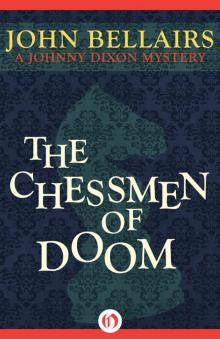 Chessmen of Doom
Chessmen of Doom Secret of the Underground Room
Secret of the Underground Room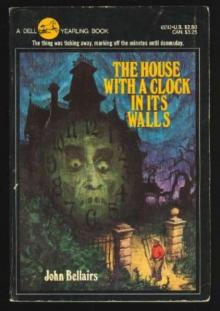 The House With a Clock in Its Walls
The House With a Clock in Its Walls The Vengeance of the Witch-Finder
The Vengeance of the Witch-Finder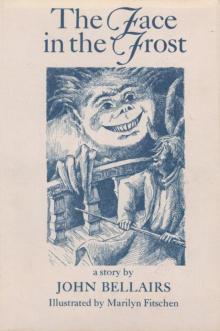 The Face in the Frost
The Face in the Frost Revenge of the Wizard's Ghost
Revenge of the Wizard's Ghost Spell of the Sorcerer's Skull
Spell of the Sorcerer's Skull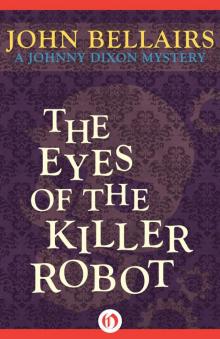 Eyes of the Killer Robot
Eyes of the Killer Robot Mummy, the Will, and the Crypt
Mummy, the Will, and the Crypt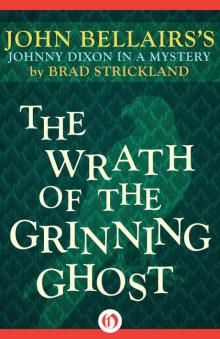 Wrath of the Grinning Ghost
Wrath of the Grinning Ghost The Mansion in the Mist
The Mansion in the Mist The Doom of the Haunted Opera
The Doom of the Haunted Opera The Bell, the Book, and the Spellbinder
The Bell, the Book, and the Spellbinder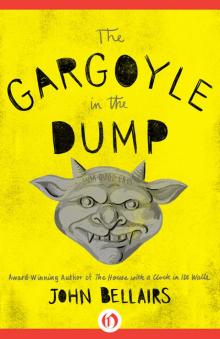 The Gargoyle in the Dump
The Gargoyle in the Dump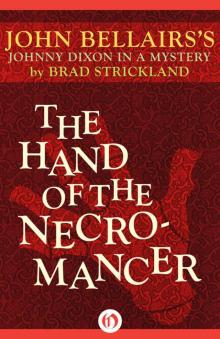 The Hand of the Necromancer
The Hand of the Necromancer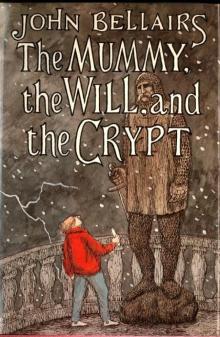 The Mummy, the Will, and the Crypt
The Mummy, the Will, and the Crypt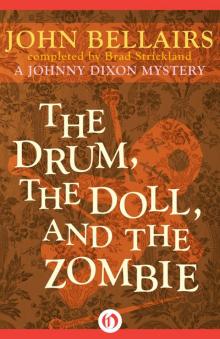 Drum, the Doll, and the Zombie
Drum, the Doll, and the Zombie The Specter from the Magician's Museum
The Specter from the Magician's Museum The Letter, the Witch, and the Ring
The Letter, the Witch, and the Ring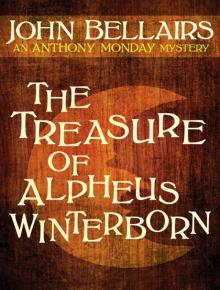 The Treasure of Alpheus Winterborn
The Treasure of Alpheus Winterborn The Dark Secret of Weatherend
The Dark Secret of Weatherend The Figure in the Shadows
The Figure in the Shadows